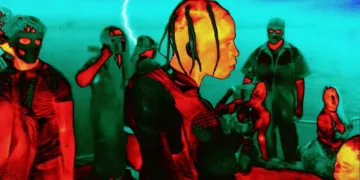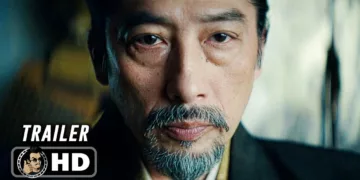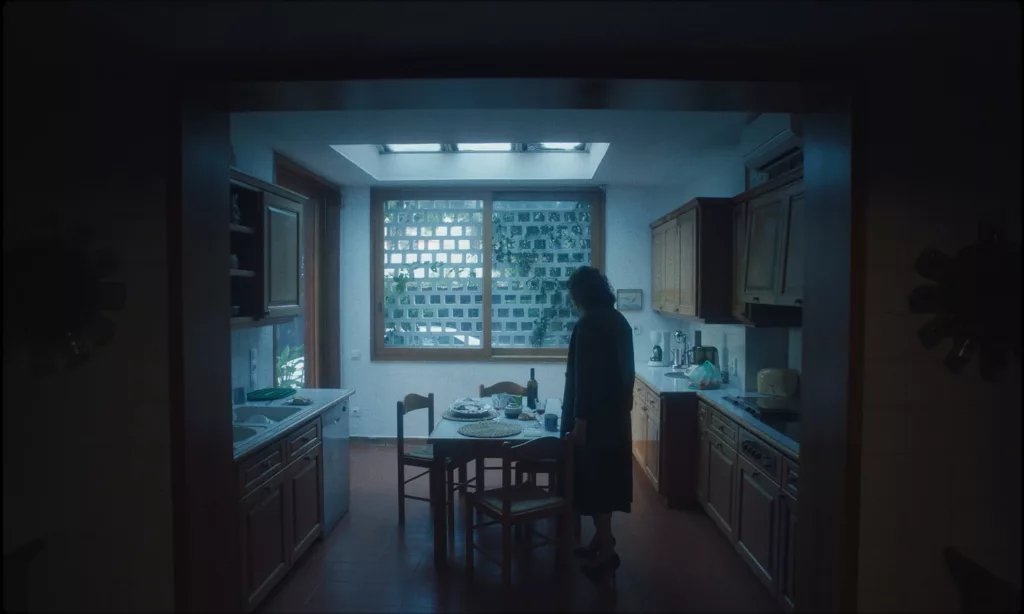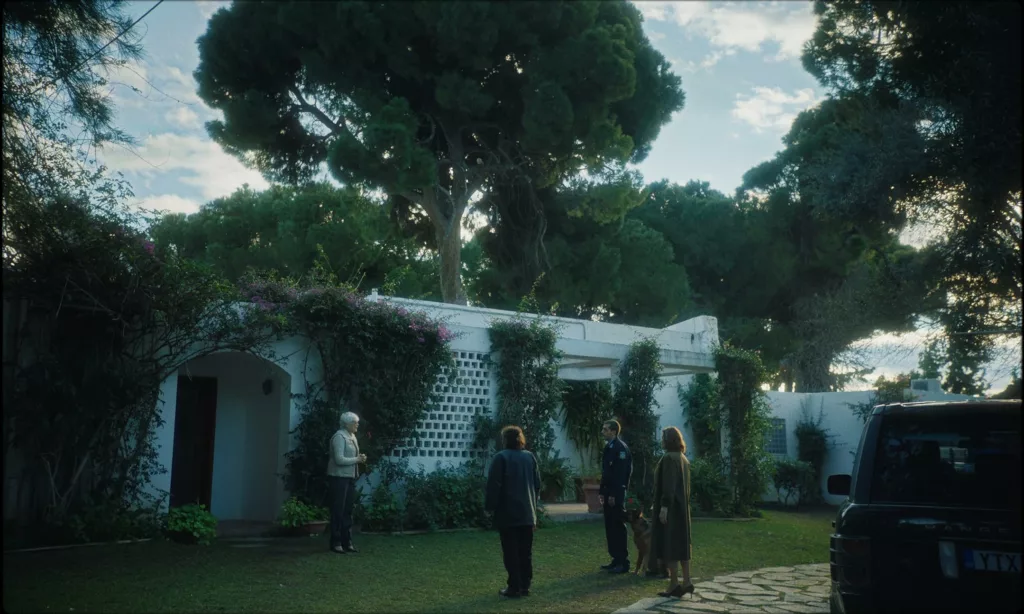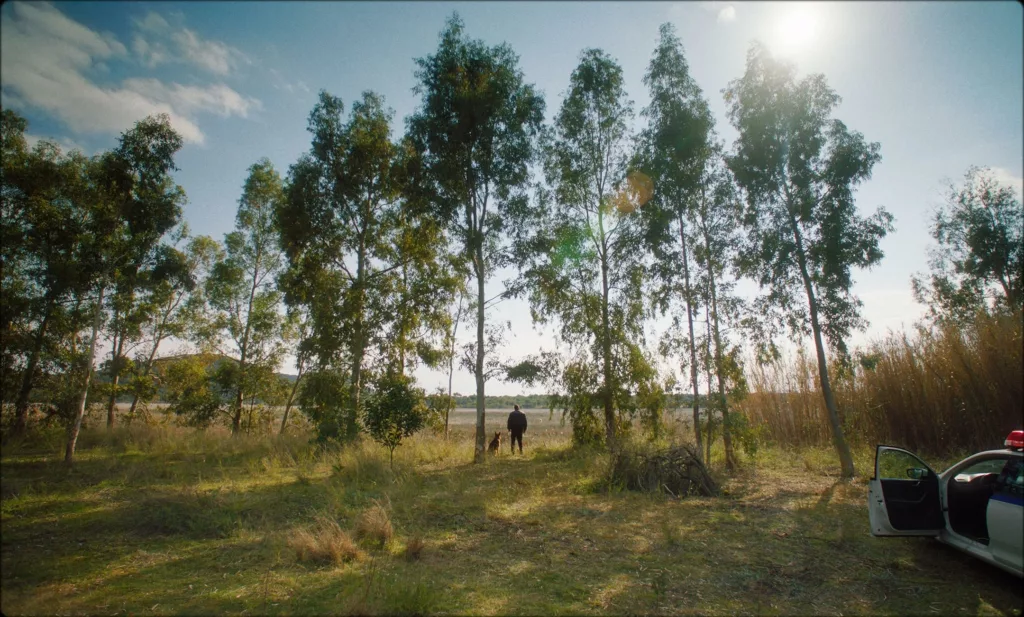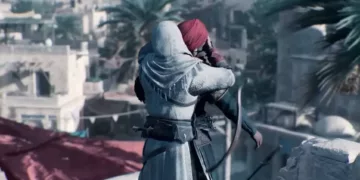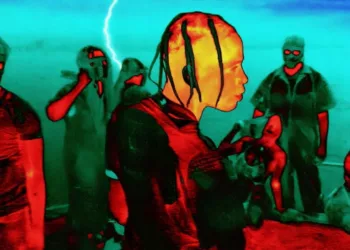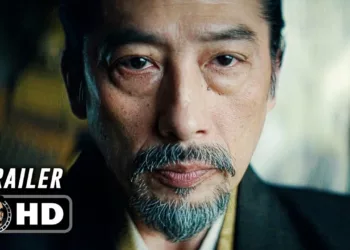Yorgos Zois’ sophomore feature Arcadia immerses viewers in a melancholy dreamscape where grieving souls wander between worlds. The film centers on Yannis (Vangelis Mourikis), a retired doctor reeling from the sudden death of his wife Katerina (Angeliki Papoulia). After identifying Katerina’s body following a mysterious car accident, Yannis travels to a gloomy seaside village to uncover how she died. He soon realizes Katerina’s restless spirit haunts him, desperate to reconstruct her traumatic final memories.
As the couple retraces Katerina’s footsteps, they uncover disquieting truths about their tattered marriage. Zois steeps the film in ominous atmosphere, shooting along the stark winter shoreline in muted blue hues. The creep of dread and despair echoes the characters’ inner turmoil. While the film’s slow pace and confusing plot turns sometimes distance viewers, patient audiences will find rewards in its uneasy emotional textures. Zois uses the supernatural premise to explore timeless themes of grief, regret, and reconciliation with poetic insight.
Subtly surreal and deeply melancholy, Arcadia locates the uncanny in the everyday, challenging assumed boundaries between the living and the dead. For all its narrative flaws, Zois rewards his audience with an evocative tone poem about lovers separated by mortality yet still inextricably tied. His ethereal direction and the central performances haunt the mind long after the credits roll.
A Haunting Tale of Emotional Bonds Tested by Tragedy
Arcadia quickly establishes an air of gloom, opening on married couple Yannis and Katerina silently driving to identify a body from a shocking car accident. Their sorrowful expressions signal this is no ordinary tragedy. Upon arriving in the remote seaside village, confusion sets in. The car’s victims are revealed as Katerina herself along with an unnamed man. Katerina’s spirit remains earthbound, trailing husband Yannis in a daze of amnesia about her death.
As Yannis investigates the accident, Katerina tries triggering her lost memories, guided by local teenagers and ghosts lingering near the crash site. Hints emerge of the couple’s strained history through extended flashbacks. These disjointed glimpses eventually weave together to uncover the accident’s disturbing origins.
While the confusing narrative leaves some plot points vague, standout lead performances ground the complex story. As the grieving Yannis, Vangelis Mourikis movingly conveys wordless anguish with his sad, drooping expressions. Meanwhile, Angeliki Papoulia courageously tackles the film’s toughest role as the disoriented ghost Katerina. Her raw vulnerability elicits empathy during even the character’s most bizarre moments. Supporting roles range from bland to contrived, but the two leads deliver enough emotional heft to carry the film.
By interweaving past and present, Arcadia builds resonant tension examining relationships scarred by guilt, regret and trauma. Patient viewers who surrender to the film’s dreamlike flow will find a rewarding (if not always comprehensible) exploration of grief’s punishing grasp on both the living and the dead.
A Moody Tone Poem on Grief’s Timeless Themes
On the surface, Arcadia’s bizarre premise seems firmly rooted in fantasy. Yet beyond the supernatural trappings, director Yorgos Zois weaves narrative threads exploring profound emotional truths. Loss, suffering, death – these inescapable realities shape human experience across eras and cultures. By tangling ghost story with marital drama, Arcadia gets to the heart of grief’s inexorable power over memory and relationships.
Zois returns here to signature themes from his breakout debut Interruption, including failed connections and mental dissolution in the wake of trauma. While his puzzling nonlinear approach challenges audiences, patient viewers will discover subtle insight into the emotional costs of refusing to let go of past wounds.
Tonally, Arcadia displays influences from both the Greek Weird Wave that launched Yorgos Lanthimos as well as showman Theo Angelopoulos’s solemn meditative films. Zois steeps his work in the same absurdist humor and affectless tone that define Lanthimos’s disjointed portraits of alienation. However, his languorous pacing and melancholic blues echo Angelopoulos’s patient ruminations on human fragility.
By fusing moods and modes of seminal Greek auteurs, Zois crafts a strange, somber drama occupying uncanny new territory. While not all of Arcadia’s disparate parts coalesce, Zois shows daring and vision as he pushes the boundaries of both supernatural and psychological realism. For all its flaws, his sophomore effort displays undeniable directorial promise through its poetic exploration of grief’s alternately tender and terrifying contours.
Gloomy Seaside as Mirror for Tormented Souls
From its ominous opening shot of Yannis and Katerina driving in strained silence, Arcadia splashes cold blues and grays across each dreary frame. Shooting along the Greek seaside in winter, cinematographer Konstantinos Koukoulios portrays the barren environment as both breathtakingly beautiful and unrelentingly bleak. Jagged cliffs tower beside churning dark waves while icy mountain peaks fade wraithlike into blankets of fog.
This melancholy landscape echoes the characters’ inner turmoil, hinting that the story unfolds in a metaphysical dreamspace hovering between worlds. Koukoulios’ meticulous compositions use shallow depth of field to blur background action and keep viewers locked on the anchor of the central couple.
The fits and starts of disorienting editing accentuate Katerina’s fractured point of view as she reconstructs her tragic fate piece by broken piece. For some, the film’s slow, circular pacing will test patience over two-plus hours. Yet those willing to surrender to the film’s dirgelike rhythm may feel rewarded by the payoff of its third act revelations and emotional crescendo.
Both sumptuous and sparse, Arcadia’s fine-tuned audiovisual craftsmanship externalizes the haunted terrain of its damaged characters. While light on plot details and perhaps overlong in the editing, Zois’ confident artistic vision rings through the movie’s masterfully melancholy atmosphere and immersive tone.
“Reunite with the beloved Portokalos family and embark on a heartfelt journey back to their Greek roots in our My Big Fat Greek Wedding 3 review. Discover how this latest installment recaptures the charm, humor, and warmth that made us fall in love with the original, while exploring new depths of familial bonds and cultural heritage.”
More Meditation Than Spectacle, Arcadia Lingers with Emotional Resonance
Arcadia doesn’t tie all its mysterious threads into perfect little bows. Even through the end credits, questions drift about the meticulous world Zois crafts. Yet the film’s closing moments deliver an emotional gut-punch as we witness the final impact of trauma on the once blissful marriage uniting Yannis and Katerina. The climax provides clarity, catharsis and closure where most needed: on the raw intimacy linking two soulmates separated by mortality.
More meditative tone poem than plot-driven spectacle, Arcadia won’t thrill viewers craving easy entertainment or clear explanations. Instead, Zois invites audiences into an unsettled space between dream and reality to unlock the mysteries of everlasting love and irreparable loss. Flawed and confounding it may be, but ultimately Arcadia weaves a hypnotic spell honoring eternal bonds forged in life yet persisting beyond death. Surrender your expectations at the door, and you may find the journey – if not its destination – offers riches.
This unusual ghost story occupies a liminal space between arthouse and grindhouse, realism and fantasy. Not all elements gel seamlessly. Yet Zois emerges as a rising directorial talent to watch by infusing conventions of both horror and melodrama with dark romanticism and poetic soul. Buried in the movie’s intentional obscurity shines radiant insight into what binds us across the ultimate divide. Recommended for fearless cinephiles up for an emotional, genre-defying deep dive exploring love’s stubborn refusal to let go.
The Review
Arcadia
By turns mystifying and monotone yet punctuated with flashes of brilliance, Arcadia proves a polarizing puzzle of a film that dances to its own peculiar rhythm. Director Yorgos Zois shows daring vision though not all his narrative risks pay off, crafting a strange and lachrymose meditation on desire's persistence in the face of death. Flawed and rewarding in equal measure, the movie casts a mesmeric midnight spell over patient viewers ready to forgo tidy explanations for glimpses of profound emotional truth.
PROS
- Strong lead performances (Vangelis Mourikis and Angeliki Papoulia)
- Evocative visuals and melancholy tone
- Thought-provoking themes related to grief and loss
- Ambitious and unconventional story structure
CONS
- Confusing, convoluted plot
- Slow pacing tests viewers' patience
- Lack of logical explanations can frustrate
- Uneven supporting character development

